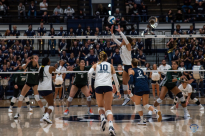The Gentleman’s Sport
SAN JUAN, Puerto Rico — A little after 4 p.m. on a Tuesday in early March, a slightly overweight, middle-aged man, sporting an orange Polo and a Gucci watch, presses his palms against the edge of a cockfighting ring and starts yelling.
“Vamos!” he shouts with authority. “Arriba! Arriba!”
Or in English, “Let’s go! Come on! Come on!”
It’s just the third fight of the day at Club Gallístico de Puerto Rico — the largest cockfighting club on the island — with only a couple hundred dollars on the line, and the man acts as if his mortgage is at stake.
Soon, the cock that he has money on starts to batter the other one. Then, not only does the man stop yelling, he sits down and starts talking on the phone as if he doesn’t have a single worry in the world.
After a 10-minute onslaught, the losing cock, whose eyes are bloodshot red, is carried out of the ring by an attendant with his bare hands, leaving a small trail of blood behind. Not one member of the male-dominated crowd, which consists of one man clad in medical scrubs, another wearing a hat that simply reads, “Cock,” and a few dozen people in total, is the least bit fazed.
Known as “the gentleman’s sport,” cockfighting is a way of life for many Puerto Ricans. Spectators are used to the brutality that comes with it. And they’ve become used to the economic boost that it provides the island.
Cockfighting generates $65 million for Puerto Rico’s economy each year, according to a recent study commissioned by the Club Gallístico de Puerto Rico and conducted by Advantage Consulting.
Per the same industry study, the sport produces 3,447 direct jobs and another 3,827 indirect jobs, all of which are important, given the economic toll that Hurricane Maria took on the island in 2017. From trainers, breeders, owners and referees, to pet stores that sell food and vitamins, glove and tape manufacturers, waitresses, and various attendants, the network of people employed by cockfighting is quite elaborate.
And now, the sport is about to be banned, potentially sending Puerto Rico’s already-struggling economy into further disarray.
“If there's no cockfighting, those businesses are going to collapse,” said Mario Marrero, a San Juan native who isn’t involved with the activity, but is the son and grandson of cockfighters.
The 2018 Farm Bill, which was signed into law last December, will prohibit cockfighting in Puerto Rico beginning December of this year.
Animal rights activists have pushed for a ban for years — cockfighting is a felony in 40 states and Washington, D.C. — but the news came as a shock to many Puerto Ricans, in what some also see as a swipe at the island’s culture from mainland America.
Gov. Ricardo Rossello said afterward that he rushed to Washington to lobby against the measure, only to get there and find out that the the bill had already been approved.
Now Puerto Ricans are bracing for the impact.
“It's going to be more dangerous not only for the people,” cockfighting expert Giselle Aviles said,
“but also for the roosters.”
Nasty, brutish and short
While a cock’s official fighting career is brief — each rooster typically fights five to seven times — its journey to get to the ring is strenuous.
Over a training process that can last anywhere from a few months to over a year, cocks are made to run on treadmills and obstacle courses and practice fights with other roosters.
“You need to breed the one that is a killer,” Marrero said.
Once the cock is finally deemed ready to fight, the process of getting the bird into the “gallera,” also known as the cockpit, is anything but simple.
On that same Tuesday afternoon at Club Gallístico de Puerto Rico, roosters shook as trainers used hot wax to attach metal spurs — which are sharp enough to puncture a lung, pierce an eye or break bones — onto their legs. The 60 or so roosters that already had the artificial spurs attached crowed loudly in tiny white cubbies off to the side, some of whom walked around in their own feces.
This was on display for all to see, with a sign that strictly prohibited the use of phones to record video or any sort of video cameras. Some in attendance took notes diligently, while others sat back and laughed.
The cocks were then transported down to the ring through an intricate conveyor belt-like system in transparent containers and shaken a few times in blue bags that could pass as laundry bags. Right before the fight, an attendant hit and antagonized the cocks with a plush rooster, and vacuumed up fallen feathers afterwards.
All of this is “unjustifiable,” according to Kirsten Peek, a spokeswoman for the Humane Society of the United States. But it was just an ordinary Tuesday for these regulars.
“It sometimes makes me sad to see the roosters hurting each other,” Adolfo Bonilla, a 99-year-old islander who has trained roosters for the ring since he was 14, said in Spanish. “But it’s a reality that you have to understand going in.”
Cockfighting might as well run in Bonilla’s blood. The great-grandfather from Yauco, which is located on the southern part of the island, is dedicated to the point that he modeled his diet after that of a rooster’s — primarily with a dish centered around cornmeal and egg — because “it serves as a comfort to them.”
The sport has changed quite a bit in his lifetime. While cockfighting has roots in Puerto Rico that date back to the Spanish colonial days in the 1700s, it was banned after the U.S. invaded the island in 1898 and didn’t become legal again until 1933 — when Bonilla was about 13.
“Fighting used to be a delight,” Bonilla, who dropped out of school to pursue cockfighting full-time, said in Spanish. “You would get to the pit at 6 a.m., have your fight, then by 4:00 p.m. you’d be back home with your rooster whether you won or lost.
“Now, its done at night and everything is much more structured with the weighing of the birds and the money involved,” he continued.
Puerto Rico, which is only about 100 miles long and is similar in size to Connecticut, has approximately 80 clubs that are regulated by its central government. The Cockfighting Affairs Commission is responsible for overseeing these clubs by issuing licenses, regulating fights and salaries, and “enforcing norms and standardized operating procedures.”
Jenniffer González-Colón, a Republican who is Puerto Rico’s resident commissioner in Congress, has actively opposed the ban along with many other Puerto Rican politicians. But because Puerto Rico is a commonwealth and not a state, González-Colón can’t vote on bills and the island doesn’t have any representation in the Senate.
If Puerto Rico were a state, there would be two senators from the island who could have clarified the consequences of the ban, along with five members of the House who could have participated in the discussion and voted.
And it doesn’t help that relations between the United States and Puerto Rico aren’t exactly on great terms given that President Trump was criticized for being slow to respond to the damage of Hurricane Maria, has mocked Puerto Rican politicians repeatedly and made inaccurate statements about the amount of recovery aid the commonwealth has received.
None of that should excuse the cruelty that cockfighting inflicts upon roosters, however, according to the Humane Society.
“Cruelty is not culture, and culture is not a rationale or a defense that the global community will accept in an atmosphere of rising animal protection sentiment,” Kitty Block, president and CEO of the Humane Society, said last December, around the time the ban was passed.
Going underground
As the fights roll on into the night, more and more people yell and more and more money is exchanged, and at big venues like Club Gallístico de Puerto Rico, thousands of dollars can be on the line at a time.
But on this particular Tuesday, the scene in the arena seems almost mundane. A pair of friendly, older women work the ticket stands while a pair of waitresses, who appear to be in their late 20s or early 30s and are clad in sports bras and tight pants, chat amiably with patrons as they deliver hot dogs and sandwiches across the arena.
The club even has a public relations professional, Karen Garnik, and advertisements for a barbeque restaurant and a healthcare company can be seen inside the concourse.
To Aviles, who has studied the sport, one interesting finding was that there are a notable amount of women who are involved in the industry in some capacity, even though bettors, trainers and breeders are overwhelmingly male.
It’s at the underground clubs, which are illegal, where people — and roosters — run into trouble.
"For people that are from modest backgrounds, [illegal clubs] work better for them,” Aviles said, pointing out that these fights are often cheaper and more informal. “But it's dangerous.
“You could be there and police can arrive and can get you in jail real quick."
Thanks to the impending ban, González-Colón expects that this is the direction in which the sport is heading — one without regulations and ripe with inconsistency and dangerous conditions.
Because there aren’t regulations, roosters could be injected with steroids or performance-enhancing substances, and might not receive medical treatment after a fight. And without a commission, there’s no structure to make sure “the gentlemen’s sport” stays that way.
There’s also the fact that the timing couldn’t be worse.
“I think the ban is necessary, not only because it's an ancient practice that is not good for the animals — they deserve dignity, too,” Aviles said. “But the process that went into putting the ban in place doesn't understand the economical crisis that Puerto Rico is having, even more right now with Hurricane Maria.”
Hurricane Maria left Puerto Rico with $80 billion in damages. The U.S. commonwealth owes $120 billion in debt and pension obligations, and students and teachers have each protested about an education system in turmoil.
So for all of the changes that Adolfo Bonilla has seen in his 99 years, the biggest one could very easily be the one that’s coming at the end of the year.
And while Puerto Rico will have had a year to prepare for the ban once it finally goes into effect, the reality is that many in the industry might not be equipped to survive it.
“So many people will be left without work with this law passing,” Bonilla said in Spanish. “By knocking down the cockfighting pit, everything goes to the floor.”








